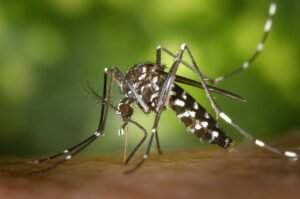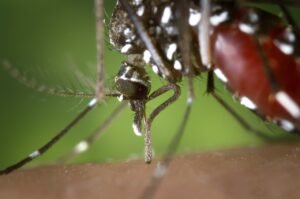How to Get Rid of Tiger Mosquito (Aedes albopictus) – Full Guide
 Asian Tiger mosquito (Aedes albopictus) is one of the most aggressive mosquitoes in the world. Asian Tiger mosquito can be very irritating since it bites during all day. It is capable of spreading dangerous diseases, and can live in very small water containers. Many people search “how to get rid of tiger mosquitoes in my yard” because this insect is now in many countries in Europe, USA, Asia, Africa, and Australia.
Asian Tiger mosquito (Aedes albopictus) is one of the most aggressive mosquitoes in the world. Asian Tiger mosquito can be very irritating since it bites during all day. It is capable of spreading dangerous diseases, and can live in very small water containers. Many people search “how to get rid of tiger mosquitoes in my yard” because this insect is now in many countries in Europe, USA, Asia, Africa, and Australia.
Table of Contents
ToggleWhat Is a Tiger Mosquito?
-
Aedes Albupictus look like a Black mosquito with white stripes on legs and body.
-
It is a bit smaller than the common house mosquito.
-
Bites in the day and evening, not only at night
-
Each flight is very abrupt and irregular, constantly turning sharply, making it very difficult to catch
- Can live in cities, villages, and rural areas.
Are Tiger Mosquitoes Dangerous?
Yes, Asian Tiger Mosquitoes are considered among the deadliest creatures on Earth because they serve as vectors, transmitting a wide range of diseases.
-
They can carry dengue, chikungunya, Zika virus, yellow fever.
-
Bite many times in a short period.
-
Can spread quickly in neighborhoods because they breed in tiny water spots.
What Is the Life Cycle of Tiger Mosquito?
For the mosquito control is very importan to understand the mosquito life cycle
-
Eggs: Laid on walls of small water containers. Eggs can survive dry months.
-
Larvae: Live in water and eat small organic material.
-
Pupae: Transform into adults inside water.
-
Adult: Lives 2–4 weeks in bushes that keeps humidity and near the waters. They start biting after a few days.
As you may have noticed, all stages of the mosquito life cycle need to remain close to water.
Where Do Tiger Mosquitoes Breed?
Tiger mosquitoes can lay eggs in very small objects that hold water. They don’t need a swamp; even a small pot can be a perfect environment.
-
Buckets, flower pot trays, old tires, water tanks.
-
Gutters with water, bottle caps, rain collectors.
-
Any small container with rain or tap water is enough.
How Far Do Tiger Mosquitoes Fly?
-
 Usually the mosquitos stay close to the place they are born.
Usually the mosquitos stay close to the place they are born. -
Most mosquitoes fly less than 200–300 meters. But if in each life cycle they lay eggs 200 meters farther away, the spread can be significant.
-
This means if you have tiger mosquitoes, they are breeding very close your home.
Tiger Mosquito vs Common Mosquito – What Is the Difference?
The tiger mosquito (Aedes albopictus) differs from common mosquitoes in several ways. As we said they have distinctive black-and-white striped legs and body, whereas common mosquitoes are usually brown or gray. Tiger mosquitoes are aggressive daytime biters, while most common mosquitoes are active at dusk and night. They can breed in very small containers of water, unlike many common species that prefer larger, stagnant water sources. Importantly, tiger mosquitoes are known vectors of diseases such as dengue, chikungunya, and Zika, making them a greater public health concern in many regions.
-
Tiger mosquito bites in the day, has black body with white stripes.
-
Common mosquito (Culex) bites mostly at night, brown color, no white stripes.
-
Tiger mosquito is more aggressive and can carry more tropical diseases.
What Diseases Can Tiger Mosquito Spread?
Each mosquito genus or species has a different ability to transmit diseases.
This “specialization” is due to biological and genetic factors: the pathogen can only develop in specific species.
- Anopheles → (Plasmodium spp.)
- Aedes aegypti / Aedes albopictus (Tiger mosquito) → Dengue, Zika, Chikungunya, Yellow fever.
- Culex → West Nile virus, encephalitis (e.g., St. Louis, Japanese encephalitis), filariasis.
Symptoms of various diseases transmitted by mosquitoes
- Dengue Fever: High fever, muscle pain, sometimes dangerous bleeding.
- Chikungunya: Strong joint pain, can last weeks.
- Zika Virus: Mild fever, rash; dangerous for pregnant women.
- Yellow Fever: Can cause liver problems and death.
-
West Nile Virus: In some areas, can affect brain and nerves.
These diseases make tiger mosquito control very important even in countries without tropical climate.
How Long Do Tiger Mosquitoes Live?
-
Adult tiger mosquito lives around 2–4 weeks.
-
Eggs can survive dry winter for months and hatch when water comes.
-
This means even if you do control, eggs can restart population next season if not removed.
Are Tiger Mosquitoes Active in Winter?
-
In cold countries, adults die but eggs survive.
-
In warm countries, they can stay active all year.
-
In cities with mild winters, they can appear on warm days even in December or January.
Do Tiger Mosquitoes Bite Dogs or Cats?
-
Yes, they can bite pets and spread some viruses.
-
Keep pet water bowls clean and change water every 1–2 days.
-
Use safe repellent for animals if needed (ask vet).
How to Prevent Tiger Mosquito in Your Yard and Home
-
Remove standing water: Empty buckets, plant trays, bottles, toys.
-
Cover water tanks and rain barrels.
-
Clean gutters so no water stays inside.
-
Change pet water bowls every 1–2 days.
-
Use window screens and mosquito nets.
How to Get Rid of Tiger Mosquitoes – DIY and Professional
DIY Methods:
-
Use approved and legal for DIY use, mosquito sprays in and around house.
-
Treat water you cannot remove with larvicide tablets.
-
Place mosquito traps on balcony or garden.
-
Mix water with a few drops of dish soap – larvae cannot survive the surface tension.
-
Use a fan on balcony or patio – tiger mosquitoes are weak flyers.
Natural Repellents:
-
Grow citronella, basil, lavender near windows.
-
Use lemon eucalyptus oil or spray on skin.
Professional Control:
-
Licensed pest control company can do fogging to kill adults.
-
They use approved larvicides in breeding spots.
-
Source reduction program to remove all water sites in your area.
When Is Tiger Mosquito Season?
-
Likes warm temperatures (20–30°C).
-
In temperate countries: from spring to late autumn.
-
In tropical countries: all year round.
-
Eggs can survive winter in cold areas and hatch in spring.
How to Protect Yourself from Tiger Mosquito Bites
-
Wear long sleeves and light-colored clothes outside.
-
Use skin repellent with DEET, picaridin, or lemon eucalyptus.
-
Avoid being outside early morning and late afternoon when they are most active.
-
Install fine mesh on windows and doors.
Common Questions People Ask About Tiger Mosquito
Do tiger mosquitoes bite at night?
Yes, but they are more active during the day and evening.
Can tiger mosquito eggs survive winter?
Yes, eggs can stay dry and hatch next season when water comes.
Can I remove tiger mosquitoes without chemicals?
Yes, by removing all standing water and using traps, but in heavy infestations, professional treatment is needed.
How to get rid of tiger mosquitoes fast?
Remove all water, use larvicides, set traps, and do professional fogging if needed.
Final Tips to Control Aedes albopictus Fast
-
Remove water every 3–4 days around home.
-
Combine DIY traps with professional control for big problems.
-
Educate neighbors because mosquito control works only if everyone cleans their yard.
Interested in learning more about mosquitoes and other common pests such as cockroaches, centipedes, rats, flies, and wasps? Explore our blog for detailed guides, expert tips, and effective solutions to keep your home and business pest-free.
Disclaimer
This article is for informational purposes only. Pest control laws and approved chemicals vary by country. For best results and legal safety, we strongly recommend contacting a licensed pest control professional in your local area. Always make sure that the pest control technician is properly certified or licensed, depending on your country’s regulations. It’s important to confirm that they only use approved products and apply them exactly as instructed on the product label. In most places in Europe, UK, or USA, following label directions is not just best practice—it’s the law.
Nasos Iliopoulos,
ΒSc Agronomist & Certified Pest Control Expert
Scientific Director, Advance Services (Athens, Greece)
Licensed Pest Control Business – Ministry of Rural Development & Food (GR)
